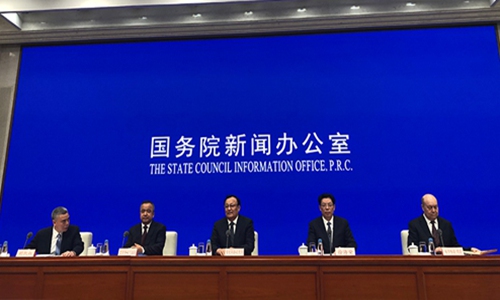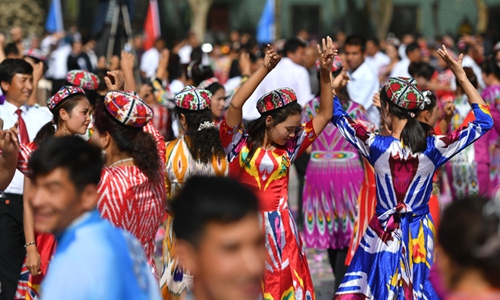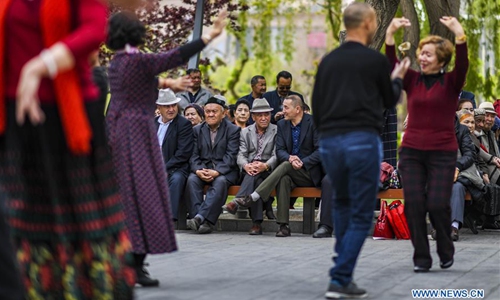HOME >> CHINA
Xinjiang trainees graduate
By Liu Xin and Zhang Hui Source:Global Times Published: 2019/12/10 0:03:39
Flexible, regular courses available to the community

Residents in Urumqi, regional capital city of Northwest China's Xinjiang Uyghur Autonomous Region celebrate the 70th anniversary of the founding of the People's Republic of China on October 3. Photo: VCG
Trainees who used to be influenced by extremism have graduated from the vocational education and training centers in Northwest China's Xinjiang Uyghur Autonomous Region, and the training centers will open to officials, herdsmen and people willing to gain vocational skills, a senior Xinjiang official said at a press conference on Monday.Experts said Xinjiang could draw on its experience from training centers on de-radicalization to develop more flexible ways, including offering de-radicalization education to individuals in residential community, considering the complexity of fighting terrorism and extremism in the region.
"Trainees who took courses in standard spoken and written Chinese language, law, vocational skills and courses on the eradication of extremism have graduated from the training centers. With the help of the local government, they have acquired stable jobs, improved their livelihood and lived a happy life," Shohrat Zakir, chairman of the Xinjiang regional government, told a press conference held by the Information Office of the State Council in Beijing on Monday.
Shohrat said some foreign media's reports of over a million or even 2 million trainees in the centers are "slanderous and groundless."
On "Uyghur Human Rights Policy Act of 2019" passed by the US House recently, the chairman said the bill has violated international laws and interfered in China's internal affairs, and stands on the opposite side of the Chinese people and international morality.
The US bill aims to provoke relations between different ethnic groups in China and undermine stability and development, but Xinjiang residents are best qualified to speak on Xinjiang affairs, and the US action will not disturb Xinjiang's development, the chairman said.

Photo: Xinhua
Long-term, complex work
Xinjiang has gained useful experience from its series of counter-terrorism and de-radicalization measures in the past three years, especially from the training centers. Trainees who had been influenced by extremism have greatly changed for the better and local security situation has been improved, said Zhang Yonghe, executive dean of the Human Rights Institution of Southwest University of Political Science and Law in Chongqing.
Fighting terrorism and extremism is a long-term and complex work and no country can accomplish it swiftly. Xinjiang could develop de-radicalization work into more flexible ways and offer de-radicalization education in residential communities to individuals who have been influenced by extremism, Zhang said.
Zhang told the Global Times that "people of all ethnic groups in Xinjiang have a deep understanding of the importance of counter-terrorism and de-radicalization work during the past years and it is highly unlikely that Xinjiang would see the spread of extremism and outbreak of terrorism again."
At the Monday press conference, Xu Hairong, Communist Party of China secretary of Urumqi, shared three stories of the trainees to show their changes after studying in the training centers.

Photo: Liu Xin/GT
A trainee named Dilixiati used to run an agritainment and live a good life. But she was being influenced by extremist ideas and thought having a "heretic" for dinner under the apricot tree "made her farmhouse dirty." So she cut the tree and closed her agritainment business. Without a stable income, the family struggled.Another trainee name Buzuola Rouzi, who learned embroidering, is now opening a workshop on hand-made embroidery products. He is helping more than 30 villagers in his workshop shake off poverty.
"Many similar stories happened in Xinjiang. People in Xinjiang know that if it was not for the training centers, there would be no peaceful life," Xu said.
Li Wei, a counter-terrorism expert at the China Institutes of Contemporary International Relations in Beijing, said Xinjiang's achievements on fighting terrorism and eradicating extremism also strike a blow to overseas "East Turkestan" terrorist groups, international terrorist organizations and anti-China forces.
"These forces are not resigned to their failure in Xinjiang. They will keep sending terrorists back to Xinjiang and try other ways to make trouble in Xinjiang. The US' recent passing of the 'Uyghur Human Rights Policy Act of 2019' also offers support to terrorist groups outside China," Li said.
"We should always be alert to these overseas terrorists," Li said, noting that if terrorism and extremism surface again in Xinjiang, effective measures, including the training centers, would be taken by the regional government.
Under the principle of personal willingness and choices, the training centers in Xinjiang are now offering daily and open training to village officials, members of the Communist Party of China, farmers and herdsmen, and people who did not graduate from middle or high school. The courses are on laws, vocational skills and standard Chinese language, Shohrat noted.
"The role of the training centers is not based on pressure from some Western countries and media, but in line with improving the counter-terrorism situation in Xinjiang. Xinjiang now aims to cement the previous achievement of eradicating extremism and also pays close attention to the new rise in extremism," Xu Jianying, a research fellow at the Chinese Academy of Social Sciences' Research Center for Chinese Borderland History and Geography, told the Global Times.

Photo: China News Service
Choose to ignoreThe two documentaries of Xinjiang's counter-terrorism work, aired on CGTN on Thursday and Saturday, were also streamed at the Monday press conference. They showed videos of the Urumqi riots on July 5, 2009 and the Tiananmen Square terror attack on October 28, 2013.
Muhammad Asghar, a correspondent from the Associated Press of Pakistan, who visited the training centers in Xinjiang in January, told the Global Times that the videos of horrible terror attacks were "hard to see" and showed the severe threat of terrorism in Xinjiang.
Asghar said Xinjiang's counter-terrorism and de-radicalization work, especially the training centers, was successful. The training centers also successfully decreased the incidence of extremism in Xinjiang. Countries which face the threat of terrorism and extremism could learn from Xinjiang's experience.
Not many foreign reporters paid attention to the documentaries like Asghar did.
Chinese Foreign Ministry spokesperson Hua Chunying asked foreign reporters who attended the press conference on Monday how many of them watched the documentaries. None said yes.
Hua said that while the documentaries have been widely discussed by netizens in China and overseas, the mainstream Western media chose to remain silent.
"You are very concerned about Xinjiang topics. When people made malicious lies, you are keen on reporting them; but when the truth and facts about Xinjiang are unveiled, you deliberately avoid these. Why? What are you worried about? What are you afraid of? Aren't you going to reflect on this?" Hua asked.Regardless of whether some Western media report it or not, the truth about Xinjiang will not change. "Lies will not cover the truth forever. As media, you have the responsibility to offer the basic facts and truth, not to pretend to be blind or deaf and mislead the public," Hua said.

People dance at the People's Square in Korla, Northwest China's Xinjiang Uygur Autonomous Region, April 10, 2019. Photo: Xinhua
Senior Xinjiang officials also refuted some fake news and rumors on Xinjiang at the State Council Information Office's press conference on Monday.In response to questions in some foreign media reports that Xinjiang violated Muslims' religious freedom and destroyed mosques, Erkin Tuniyaz, vice-chairman of the Xinjiang regional government, said Xinjiang fully respects and protects people's religious freedom.
Erkin said religious and non-religious people in Xinjiang enjoy the same rights and no citizen has been discriminated on or unjustly treated. Xinjiang has more than 20,000 mosques and 29,000 Islam religious faculty and staff. There are 103 Islamic associations and 10 religious institutions in Xinjiang. Xinjiang has also organized chartered flights for more than 50,000 religious people for their pilgrimage to Mecca.
"Xinjiang has never removed mosques, but improved the facilities in mosques," Erkin said, noting that the mosques in Xinjiang have been equipped with electronic screens, flush toilets, air conditioners and firefighting equipment.
"Religious freedom policies have been fully implemented in Xinjiang and the rights of religious people, including Muslims, have been guaranteed. We hope that some Western politicians and media that adopt double standards and bear bias toward China's religious policies could take a correct attitude with regard to China's religious situation and stop interfering in the domestic affairs by hyping religious topics," Erkin said.
Xu Hairong, Party secretary of Urumqi, refuted reports of The New York Times and the International Consortium of Investigative Journalists on Xinjiang, saying their reports were slanderous and smeared Xinjiang's training centers and counter-terrorism work. "The great efforts made by officials and people of all ethnic groups to restore the stability and peace of Xinjiang should be viewed justly and fairly," Xu said.
One sentence repeatedly mentioned by the officials attending the Monday conference was that "Xinjiang people have the final say on whether Xinjiang's policies are good," and they invited more people to come to Xinjiang to witness the prosperity of the region.
Posted in: SOCIETY